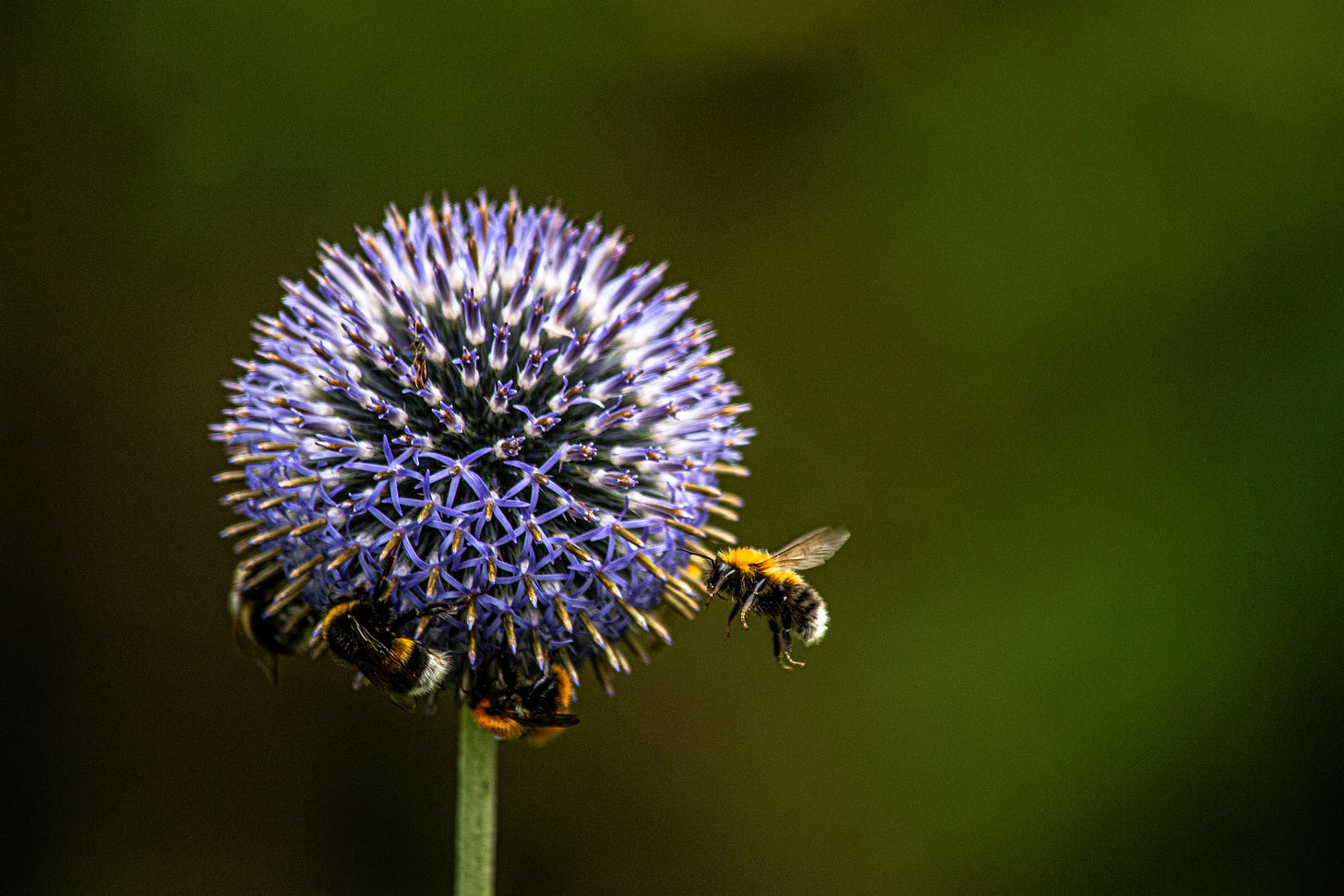Why What We Most Want, Most Escapes Us + How 'Giving' Resolves the Paradox
Alternative title: The Strange Game That is Pursuing Anything At All
I caught up with a friend recently, and we were both talking about what it’s like to be in your 30s, living abroad, and being single.
We spoke about dating apps, and how strange the dating game was. How there were these rules that though unsaid, had to be followed. Such as how soon to get back to someone, or how to ensure that you “seem interested” through the courting phase.
All of it seems rather … taxing. Which is good, for me at least. One less distraction from the writing. :)
One observation she mentioned struck me:
When you’re most interested in pursuing a relationship, potential partners seem elusive. And when you’re least interested in a relationship and busy with other things in your life; be it your career, some travel plans, or any other pursuit — potential partners seem abundant.
On my walk back home, I wondered if we could put it down to “You seem more interesting when you are interested in something”, but I felt there was more to it.
I also felt this was not only true of pursuing romantic relationships, but also seemed true of other pursuits in life.
Such as our careers: When we’re “desperate for a job”, connections, success; they seem to get further away, and when we are relatively content with where we are in our careers; opportunities, connections and success seem to come more easily.
Or how ideas for entrepreneurial or creative projects are often born: When the founder or creative person wants an idea; to perhaps build a business, create a symphony, or something to that effect, it’s near impossible to “find an idea”. But when they work on something, they get more ideas.
To put it simply:
When we really want something, it seems to escape us.
When we don’t want it so bad, we might have our best shot at having it.
What on earth is going on?
‘Deficit’ or ‘Ego’ seemingly create this paradox:
Several days later I found myself in a whole other conversation, with someone else, where — funnily enough! — the paradox was in some way, clarafied for both of us. I’m going to attempt to share that clarity here with you, dear Reader. :)
When one wants, one’s mindset may easily fall into a place of deficit; for wanting entails not having, or a place of ego; for wanting entails taking.
When it comes to relating with others, when one is coming from a place of wanting, as in not having or taking, ergo deficit or ego, they are easily mistaken for having nothing to offer or give.
In short, not much can be gained from their presence. Be that as it may; as potential romantic partners, or even professional connections.
Not because one who wants is invariably one who has nothing to give. Rather because one whose principal intention is wanting, is more likely to be perceived as having nothing to give, or as being selfish.
Those with anxious tendencies might relate with this, but this is merely an extreme example highlighting the underlying principle we’re trying to decode here.
Anyway, when one’s mindset is rooted in deficit or ego, potential romantic partners seemingly dwindle, as do potential “leads” for whatever it is we seek in our careers.
I find the following metaphor helps distill the paradox into a digestible principle:
A dying flower attracts fewer bees, and thereby reduces its chances at pollination — irrespective of how badly it wants to be pollinated. AKA: When one is operating from deficit “the network” around, seems to run dry, even in nature.
How this metaphor applies to us:

“Wanting”, is an insufficient strategy for “Getting”:
Applying the above metaphor to the context of careers and relationships, we find that we cannot merely fulfil our goals (pollination, in the flower’s case) by wanting them so.
Just as the bees are gatekeepers who enable the flower’s pollination goals, other people enable our professional and romantic goals.
People are the gatekeepers of opportunities in our professional lives. “Opportunities” don’t exist in thin air. Someone faces a problem that needs to be addressed, or needs some value to be created, that’s what opportunity boils down to. If others are not aware of the value one creates, opportunities are unlikely to find their way towards them.
(The LinkedIn version: Create value. Communicate your value when needed.)
<Now that I mentioned LinkedIn, Wharton’s organisational psychologist Adam Grant comes to mind. In his book, Give and Take, where he finds that “otherish givers” (those who give to others without forgoing their own interests) are more successful in business than takers, matchers and selfless givers.>
The same is true in our romantic relationships. Any healthy romantic relator who makes a potential partner is foremost their own gatekeeper, as they “let one in” into their own life by choosing another person as their partner; and in so doing; extend the concept of their self, to include the other.
All of which begs the question: What does one bring to the party?
Turn On The Giving — A seemingly elegant solution:
It appears, one has to stop operating from a place of want/take, ergo deficit or ego, and start operating from a place of have/give, ergo surplus or selfless, in order to get what they want.
We have to give something, in order to get what we want.
I call it ‘Turning On the Giving’, because we can choose to do it consciously.
In the career context; turning on the giving simply looks like creating more value for others. In the romantic context; well, let me know when you find out. :)
But if we were to stick to the context of our careers: Turning on our giving, creates value for others, makes our presence valuable, thereby the gatekeepers who need to solve problems or have value created and are more likely to gravitate toward us.
As the flower blooms and produces more nectar, bees are more likely to see it, come for nectar and in consequently enable the flower’s pollination goals. If the flower wants to be pollinated, it must selflessly give beauty and nectar to the party.
To me, this metaphor helps understand the implications of turning on the giving in the romantic context: Bring beauty and nectar to the party, get pollinated. To say anything more is to bastardise essence, so if that doesn’t make sense, let’s just call it an inarticulable mystery. :)
Going back to our original examples, someone who is busy with other pursuits and now seems more interesting as a romantic partner, or someone who is content and creating value in their career and attracting more opportunities, are both people who are already in “giving mode”.
But what about the entrepreneur / creative person who gets more ideas as they work?
Why working on something, gives you more ideas:

While turning on the giving unpacks the paradox for situations that entail connecting to others; romantic or professional pursuits in this case, how do we get it to make sense of the other scenario we saw earlier:
That creative people and entrepreneurs who want ideas seem to find more ideas, not when they are “looking for ideas”, but when they are working on something.
What’s at work here?
Perhaps what’s at work here is merely the brain.
Just as a blooming flower rich in nectar is more likely to activate a network of bees, a firing neuron is more likely to activate more neurons in the surrounding network.
When a creative person or entrepreneur is “working on something” they are either practicing their skill; as they code some code, make some music, paint some paintings, hustle some hustle, or they are pursuing active learning; like studying code, music theory, looking at paintings, listening to GaryVee, in which case they are gaining new and relevant information to aid their craft.
During which, their neurons are firing actively. The neurons; in effect, are “giving off” signals to the surrounding network of neurons.
More connections in their brain occur, new neural pathways are created.
Connections are made. Ideas are born. Value, created. Flowers bloom. Nectar flows. The birds and the bees get busy.
I guess that’s why the dating app is called Bumble.
—
Playing in the background: Tandanu - Indian Ocean, feat. Shankar Mahadevan

